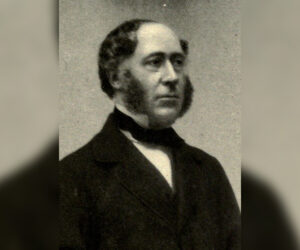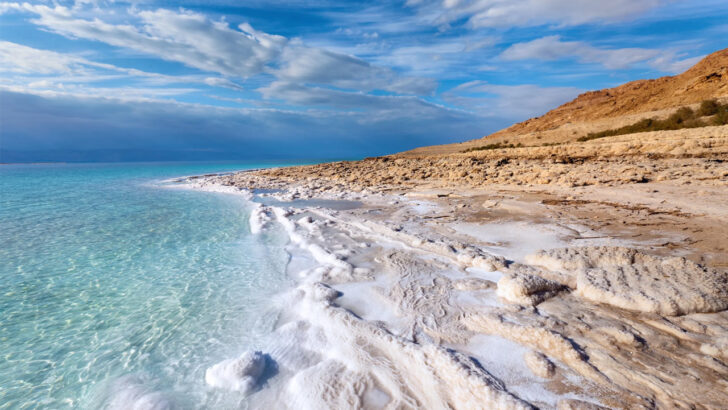‘Irish Explorers of the Jordan Rift Valley and the Euphrates Valley in the 1830s: Scientific Adventure and Imperialism’, in George Moore: Dublin, Paris, Hollywood, by Haim Goren, edited by Conor Montague and Adrian Frazier
(Irish Academic Press, €26.99 pb/ €44.99 hb)
I was recently given this book as a present from someone who knew of my great interest in George Moore. The connection is a strange one, in that a governess of the Moore boys at Moore Hall later went on to the children of an ancestor of another family connection. The belief in the family was that this governess with her strict Jansenist views was responsible for Master George’s views in later life.
I would not expect all readers of this paper to share this interest. But one article in this splendid collection caught my attention at once, as having an element that would indeed interest readers.
It deals with the role of George Henry Moore, the owner of Moore Hall, in the days of the Land War, and the father of George and Col. Maurice Moore, as a pioneering explorer of the Holy Land.
At this time of year many people are setting off on pilgrimages to the Holy Land (a place now more dangerous than it was in the days of the Ottoman Empire).
They take with them guides of all kinds, the best of which might be noted here. The work of Fr Jerome Murphy-O’Connor for the historically minded, and of course our own Michael Kelly, for a well informed pocketbook to carry with you.
Connection
For an overview of our own nation’s connection with the Holy Land over the centuries there is Con Costello’s Ireland and the Holy Land (1974), a former army officer’s tribute to the region where he served in a vital role with the United Nations.
The knowledge we find in these excellent guidebooks of today is ultimately reared on the work and exploits of those who began in the 19th Century to survey the Holy Land and map it, recording as they did so the all-important place names.
The aim of modern scholarship to see Jesus in his own place and time is important to the deepest understanding of the New Testament. The time and the place are important. So explorers have a role just as important as textual scholars.
The idea of an Irish man in 1837, not merely visiting, but consciously exploring the Jordan Valley is indeed an exciting one”
The pioneering work of the survey of Palestine was done on the ground by such men as George Henry Moore. The author of this paper, alas, is unclear in his mind about the importance of the Moore family in Irish life, of their connection with the Rebellion of 1798, of GH Moore as a leader of the Irish Independent Parliamentary Party that preceded Parnell’s party, of Col. Maurice and George as Irish patriots in their very different ways and indeed of George Moore in his novel The Brook Kerith (1916) as a very different kind of explorer of the Holy Land.
So I thought the notion of an Irish landlord as an explorer in the path of the patriarchs, of the Apostles and of Jesus was not to be neglected. But the idea of an Irish man in 1837, not merely visiting, but consciously exploring the Jordan Valley is indeed an exciting one. Though his later efforts were frustrated and met with disappointment, it in no way detracts from the extraordinary nature of what he discovered.
By scientific tests on site, so to speak, he found that the Dead Sea, which had attracted the attention of travellers for centuries, lay more than 1,292 feet (394 metres) below the level of the Mediterranean; and more than that, the actual bed of the Dead Sea itself lies 2,570 feet (783 metres) below sea level.
These figures are from a German-American scientist; Haim Goren, though hailing the importance of the discovery, fails to bring out the underlying significance for today of what Moore and his colleague, WG Beke had found.
This discovery of how great a slash nature had made through the rocks in this northern extension of Africa’s Rift valley was recorded and applauded in the professional geographical journals, but seems to have attracted little attention at home as Moore was described in the by scientists across Europe as an ‘Englishman’.
There were quite a number of other Irish men involved in later forays into the Holy Land in quest of scientific knowledge, and some are mentioned here – indeed enough to compile into a book. But Moore’s discovery, though among the earliest, remains the most significant.
The author of the article does not allude to this aspect of the matter – he has other modern anti-Imperialist considerations on his mind. I allude to it here as I think it is very important. In about 1925 a French engineer Pierre Gandrillon proposed that the differential fall between the sea and the lake could be utilised in a grand scheme for power generation.
This involved pumping sea water from near Haifa through a canal down through what was then the British Mandate territory and the Kingdom of Jordan to fall into the Dead Sea after passing through two power plants.
Troubled
The troubled state of the British Mandate meant that politics and religion as well as cost precluded the scheme. But in 1934 an American expert, Dr Walter Lowdermilk, proposed a variant of the plan with the canal running through Mandate Territory only.
The political situation which prevented these engineers’ dreams from going ahead has only grown more extreme.
Yet they are quite practical and do not interfere with the flow of the Jordan such as it is. We always tend to think of the Jordan from our childhood as a great broad pleasantly streaming river. It is no such thing. It is a very unattractive water course that ancient Hebrew writers thought little enough of, and that even the Bible has little praise for.
The discovery of that Irish gentleman George Henry Moore will receive its right and proper praise”
Still it is now lodged in the imaginations of Jews, Christians and Muslims alike that it must be left untouched.
But it is to be hoped that a time will come that the various entities with an interest in the Jordan and the Dead Sea will come together and achieve a combined reconciliation of the engineering problems and begin to produce the energy so badly needed sans oil.
When that time comes the discovery of that Irish gentleman George Henry Moore will receive its right and proper praise. History exists to remind us not only of lost greatness, but also of future possibilities.
But what has this to do with religion? I have been asked. Anything that helps our understanding of the time and the place of Jesus is surely important. As I say, an understanding of the Truth can only be built on a solid foundation of truth.



 Peter Costello
Peter Costello The salt encrusted shores of the Dead Sea.
The salt encrusted shores of the Dead Sea. 